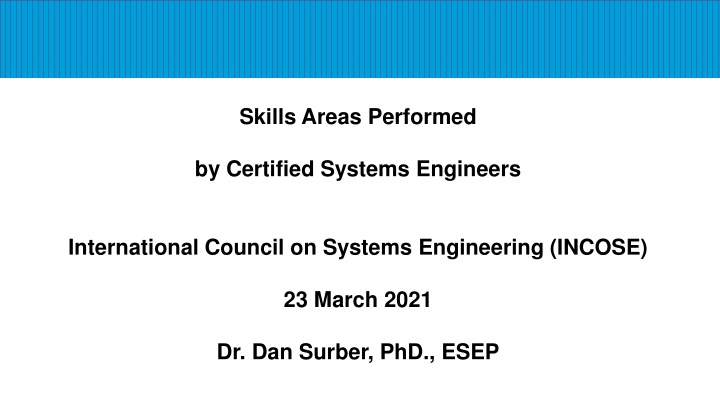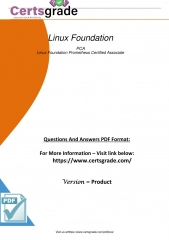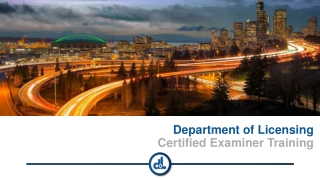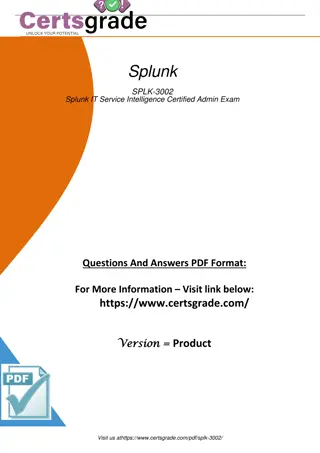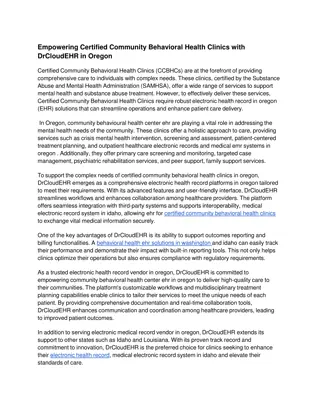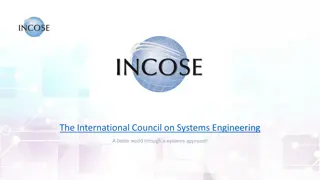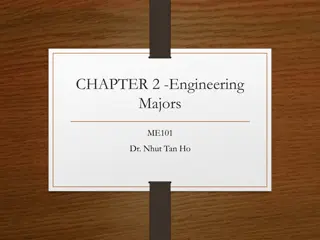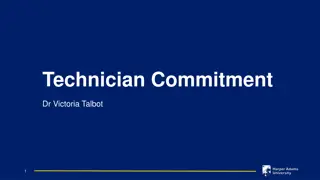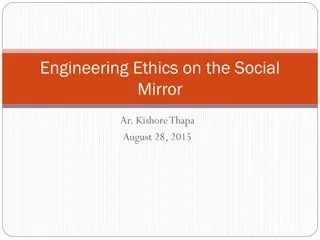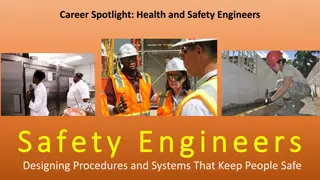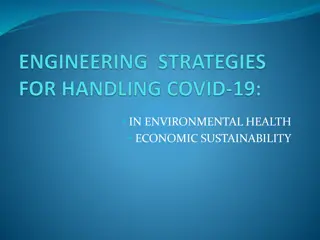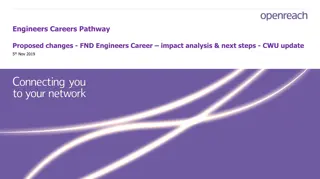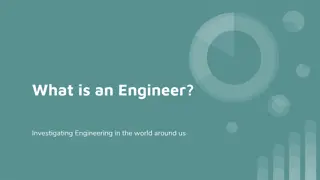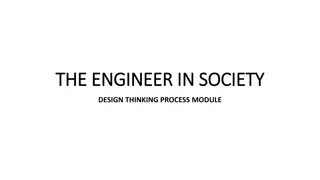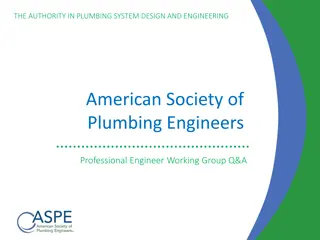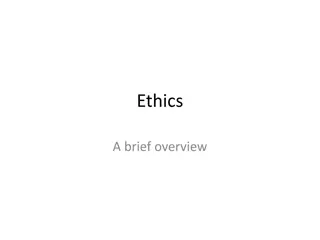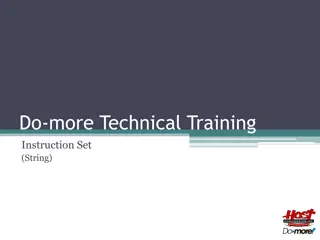Certified Systems Engineers Technical Activities
Dr. Dan Surber, an INCOSE Certified Expert Systems Engineering Professional, details technical activities in systems engineering. These include Requirements Engineering, System and Decision Analysis, Architecture/Design Development, Systems Integration, Verification and Validation, and System Transition. His extensive experience and expertise in various engineering fields make him a valuable resource in the systems engineering domain.
Download Presentation

Please find below an Image/Link to download the presentation.
The content on the website is provided AS IS for your information and personal use only. It may not be sold, licensed, or shared on other websites without obtaining consent from the author.If you encounter any issues during the download, it is possible that the publisher has removed the file from their server.
You are allowed to download the files provided on this website for personal or commercial use, subject to the condition that they are used lawfully. All files are the property of their respective owners.
The content on the website is provided AS IS for your information and personal use only. It may not be sold, licensed, or shared on other websites without obtaining consent from the author.
E N D
Presentation Transcript
Skills Areas Performed by Certified Systems Engineers International Council on Systems Engineering (INCOSE) 23 March 2021 Dr. Dan Surber, PhD., ESEP
Biography Dr. Surber is an INCOSE Certified Expert Systems Engineering Professional. He has worked as a pilot, systems engineer, accident investigator, and systems engineering manager for avionics systems and heavy equipment engineering. He has worked over 45 years with US Air Force, US Army Reserve, three large defense contractors, and a large, commercial corporation. He helped design cockpits for the AFTI/CAS F-16, F-16R, F-16 Block 50/60, RAH-66, F-22A, and MV/CV-22, He is a rated senior pilot, flight examiner/ instructor, and parachutist. He worked extensively as a human factors engineer, systems safety engineer, and military accident investigator. He has accumulated over 5,000 hours of flight and simulator time in 17 types of military and commercial aircraft; holds a pilot rating in single and multi-engine aircraft; and, is a rated parachutist. In 1998 he retired after 29 years of military service with the United States Air Force, the Army National Guard, and Army Reserve in various armor, mechanized infantry, aviation, and military intelligence units. He is a retired Engineering Fellow from Raytheon, where he worked on the Osprey program, A-10C, international border security systems, and supported process improvements as a Raytheon Six Sigma Specialist. Dr. Surber has been a member of INCOSE since 1998, and is currently affiliated with the INCOSE Crossroads of America chapter (Indiana).
Systems engineering technical activities include but are not limited to those identified in the table below. Please refer to the INCOSE Systems Engineering Handbook (V4.0): Systems Engineering Experience Areas (15): Principle SE Activities associated with each SE experience area Requirements Engineering Preparing for or managing a Business or Mission analysis; Defining a Problem or opportunity space; Characterizing a solution space; Evaluating alternative solution classes; Preparing for Stakeholder Needs & Requirements Definition; Defining stakeholder needs; Developing Operational Concept and other Life Cycle concepts; Transforming needs into stakeholder requirements; Analyzing Stakeholder Requirements; Managing Stakeholder needs and requirements definition; Preparing for System Requirements Definition; Defining System Requirements; Analyzing System Requirements; Managing System Requirements. System and Decision Analysis Preparing, performing and managing a system analysis; Decision Management, including Preparing for System Engineering Decisions; Analyzing decision information; Making and managing SE decisions. 3
Architecture/ Design Development Preparing for architecture definition; Developing architecture viewpoints; Developing models and views of candidate architectures; Relating architecture to design; Assessing candidate architectures; Managing the selected architecture; Preparing for design definition; Assessing alternatives for obtaining system elements; Establishing design characteristics and design enablers; Managing a system design; SystemsIntegration Preparing, performing and managing system element implementation; Identifying, agreeing, and managing system-level interfaces; Preparing and performing Integration; Managing integration results. (In complex systems this work may be done at subsystem levels down to the PRIME ITEM for developmental items) Verification and Validation Preparing, planning, and performing Verification; Managing verification results; Preparing, planning, and performing Validation; Managing Validation results; Preparing for, and performing System Transition; Managing results of System Transition; Obtaining Qualification, Certification and Acceptance. October 2019 DCS SYSTEMS LLC 4
System Operation and Maintenance Preparing for Operation; Managing results of Operation; Performing and supporting System/Product Operation; Preparing for and performing Maintenance; Performing Logistics Support; Managing results of maintenance and logistics; Preparing for, performing and finalizing system disposal. Technical Planning Defining an SE project; Planning an SE project and its technical management; Activating an SE project; Identifying and recording tailoring influences and mandated structures; Obtaining input from parties affected by the tailoring strategy; Making Tailoring decisions and selecting life cycle processes. Technical Monitoring and Control Planning for SE project assessment and control; Assessing SE projects; Controlling projects from an SE perspective; Preparing for and performing System Measurement; Preparing for system Quality Assurance; Performing system product or service evaluations. Acquisition and Supply Acquisition, including: Preparing for system/element acquisition; Advertising the acquisition and selecting the supplier; Establishing, maintaining and monitoring an acquisition agreement; Accepting a product or service from a supplier; Supply, including: Preparing for supply; Responding to a tender; Establishing, maintaining and executing a supply agreement; Delivering and supporting a product or service. October 2019 DCS SYSTEMS LLC 5
Information and Configuration Management Planning Configuration Management; Performing Configuration Identification; Performing Configuration Change Management; Performing Configuration Status Accounting; Performing Configuration Evaluation; Performing Release Control; Information Management, including Preparing for and performing information management. (applicable to hardware, executable software, and firmware; FPGAs or ASICs). Risk and Opportunity Management Planning technical risk and opportunity management; Managing the technical risk profile; Analyzing, Treating and Monitoring technical risks and opportunities. Lifecycle Process Definition and Management Establishing Lifecycle Processes including defining and implementing Lifecycle Models; Assessing Lifecycle Processes and Models; Improving Lifecycle Processes and Models. October 2019 DCS SYSTEMS LLC 6
Specialty Engineering one or more Specialty Engineering area(s). Typical Specialty Engineering areas include but are not limited to those identified in the INCOSE SE Handbook V4.0, namely: Affordability/Cost- Effectiveness/Life Cycle Cost analysis; Electromagnetic Compatibility Analysis; Environmental Engineering/Impact Analysis; Interoperability Analysis; Logistics Engineering; Manufacturing and Producibility Analysis; Mass Properties Engineering; Reliability, Availability and Maintainability analysis; Resilience Engineering; System Safety Engineering; System Security Engineering; Training Needs Analysis; Usability Analysis/Human Systems Integration; Value Engineering. Organizational Project Enabling Activities Infrastructure Management, including establishing and maintaining the Infrastructure; HR Management, including identifying and developing SE Skills, acquiring and providing SE skills for projects; Quality Management including planning and assessing Quality Management, Performing Quality Management corrective and preventative actions; Knowledge Management, including Planning Knowledge Management, Sharing Knowledge and skills throughout the organization, Managing Knowledge, skills and knowledge assets; Project Portfolio Management at Organizational level, including defining and authorizing SE projects, evaluating a portfolio of SE projects and terminating SE projects. Other Other functions and activities performed that you can justify as Systems Engineering activities. (new areas such as Cybersecurity or Human Systems Integration). October 2019 Performing professional-level systems engineering activities associated with DCS SYSTEMS LLC 7
